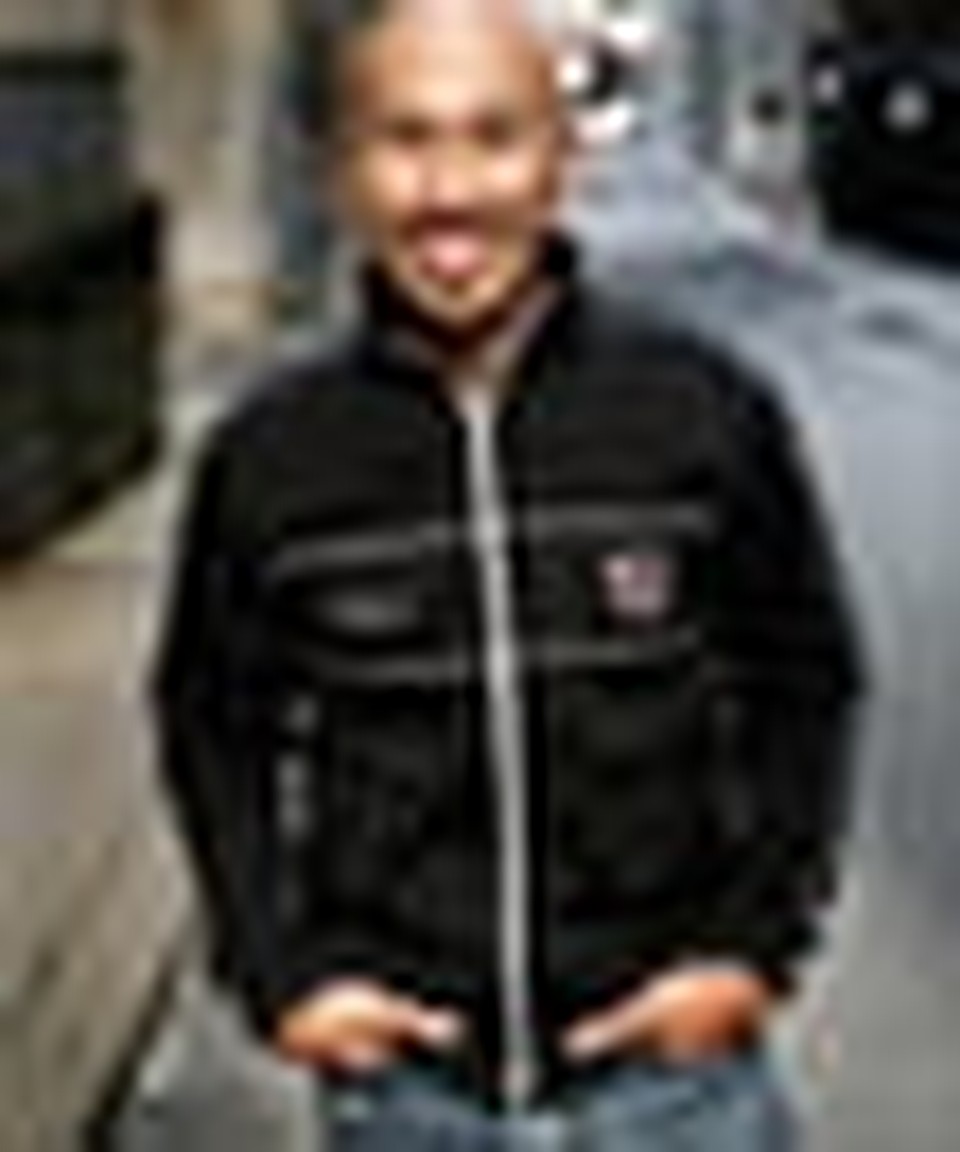Holy Spirit Q&A with Francis Chan

Francis Chan, featured in the BASIC.HOLY SPIRIT film, talks about the Holy Spirit...
You wrote a book in 2009 on the Holy Spirit called The Forgotten God. Now you have a film from the BASIC series on the Holy Spirit. Why all of this emphasis on the Holy Spirit?
I received a lot of questions about why I titled the book The Forgotten God. Some thought it was is a bit extreme. I don’t think so. From my perspective, the Holy Spirit is tragically neglected and, for all practical purposes, forgotten. That’s why I have a book and a film on the subject. While no evangelical would deny His existence, I’m willing to bet there are millions of churchgoers across America who cannot confidently say they have experienced His presence or action in their lives over the past year. And many of them do not believe they can.
Perhaps we’re too familiar and comfortable with the current state of the church to feel the weight of the problem. But what if you grew up on a desert island with nothing but the Bible to read? Imagine being rescued after twenty years and then attending a typical evangelical church. Chances are you’d be shocked (for a whole lot of reasons, but that is another story). Having reading the Scriptures outside the context of contemporary church culture, you would be convinced that the Holy Spirit is as essential to a believer’s existence as air is to staying alive. You would know that the Spirit led the first Christians to do unexplainable things, to live lives that didn’t make sense to the culture around them, and ultimately to spread the story of God’s grace around the world.
There is a big gap between what we read in Scripture about the Holy Spirit and how most believers and churches operate today. In many modern churches, you would be stunned by the apparent absence of the Spirit in any manifest way. And this, I believe, is the crux of the problem.
Don’t most Christians already know about the Holy Spirit?
Whole denominations have been built around specific beliefs about the Holy Spirit. I know people who have lost jobs at churches and Christian colleges because of their beliefs about the Holy Spirit. I even had a girl break up with me while I was in seminary because we believed differently about Him! It is not one of those issues that is easy to float over. This is especially true if you belong to a particular “camp” with a specific belief or bent.
Which is why I ask this question: are you willing to pursue truth in your journey to know and be known by the Holy Spirit? Do you have enough humility to be open to the possibility that you have been wrong in your understanding of the Spirit? It’s easy to get into “defensive mode,” where you quickly disagree and turn to proof texts and learned arguments to defend what you’ve always believed. Rather than guarding your perspective, consider taking a fresh look at familiar passages to make sure you haven’t missed something. You may end up with the same theology you’ve always had, but maybe you won’t. Don’t let your views be determined by a particular denomination or by what you’ve always been told. Within the context of relationship with other believers, seek out what God has said about His Spirit. Open up your mind and your life to the leading of the Spirit, regardless of what others may think or assume about you.
What does it mean to “quench” the Spirit?
You’re probably familiar with God’s command in 1 Thessalonians 5:19, “Do not quench the Spirit.” Do you know what it means? For years I never gave it much thought. I didn’t take the time to explore what this meant and how I could be guilty of this sin.
I look back now and realize I not only quenched the Spirit, but I also violated the next verse: “Do not treat prophecies with contempt” (1 Thess. 5:20 NIV). I had contempt toward anyone who claimed to have “a word from the Lord.” I felt it was a righteous contempt because I’d seen people use the phrase “I have a word from the Lord” to manipulate others for personal gain. Cult leaders use the phrase to secure followers and increase their own authority. How can you disagree or even have a discussion with someone who claims they heard directly from God?
So I was against all of it. I was disturbed by any claim of prophetic speech. Looking back, I believe my concerns were valid but my actions were not. The biblical response would have been to “test everything. Hold on to the good. Avoid every kind of evil” (1 Thess. 5:21–22NIV). Rather than rejecting the possibility of God supernaturally speaking through people, I should have tested what I was hearing in the context of faithful community.
On the flip side, if churches that practice prophetic utterances were quicker to reject the false prophets and prophecies by calling them out on their biblical inconsistencies (“avoiding evil”), then maybe the conservative world would be less skeptical about prophecy. Some conservatives may quench the Spirit by ignoring His working, but surely putting unbiblical words into the mouth of God is a form of quenching the Spirit as well. We need the Spirit in order to live faithfully. But we also need each other as we work out our faith.
How can you tell if a Christian gathering is empowered by the Holy Spirit?
Sometimes I leave Christian events wondering if we resemble the prophets of Baal in 1 Kings 18 more than Elijah. The prophets of Baal had a loud, passionate worship gathering that lasted from morning till evening. When they were done, they had a great time of fellowship (I think you can call it that). But “no one answered; no one paid attention” (1 Kings 18:29). After all of that, Elijah prayed. God heard his prayer, and fire came down from heaven.
My favorite part of that story comes when it is all over and the prophets of Baal are saying, “The Lord—he is God! The Lord—he is God!” (1 Kings 18:39 NIV). They didn’t say, “Elijah is a great speaker” or “Elijah sure knows how to connect with God!” They were stunned by God. They were in awe of His power. They knew that what they experienced could not have been manipulated by Elijah. They experienced the power of God.
Is that what happens at the Christian gatherings you attend? Or does it feel more like what the prophets of Baal experienced before Elijah prayed? We can have a great time singing and dancing ourselves into a frenzy. But at the end of it, fire doesn’t come down from heaven. People leave talking about the people who led rather than the power of God.
What if the Holy Spirit calls me to radical, bold living? My Christian friends will think I’m crazy!
My hope and prayer for you is that church people don't try to normalize you. What I mean is that in American churches we often try to calm people down who are just too passionate or too sacrificial and radical. I know at times I have done this to other people. And I've had it done to me.
Two years ago at a dinner I sat next to a man who runs a human-trafficking awareness organization. He described how these children, most of whom were sold or abducted into the sex trade, are raped and abused every single night, again and again, how they have no one to advocate for them, and how there is no way out.
That night I lay awake in my bed for hours—literally hours—and I imagined my own children in this situation. Maybe that was a stupid thing to do, but suddenly, vividly, I was sobbing and I couldn't get the images out of my mind. I started thinking about what I would do if this really happened to my little girl. I know that I wouldn't stop until I had saved her. I would mobilize everyone I know through whatever means possible to get them to help. Lying there in my bed that night I got more and more passionate about everything I would do to save my little girl.
Then something happened. I am not one of those people who often hears God's distinct, clear voice (though I know some people do), but on this night, the Spirit of God said to me: I want you to love them as your own children. This was overwhelming to me. After all, if I treated these kids as though they were my own, I wouldn’t stop praying for them. I also wouldn’t stop passionately begging people to figure out ways to seek them out and rescue them. I literally wept for hours. The thought of these precious children of mine being taken advantage of was unbearable. I was now on a mission. A mission from God.
I remember getting back to Cornerstone and “rallying the troops.” I was so fired up, and I got others fired up. But, over the course of several months I got distracted. People around me started calming me down about sex trafficking. They said, “Francis, you can't save the world” and “You're already doing so much. Don’t be so hard on yourself.”
Things like this happen all the time. As a church, we tend to do this to people who are passionate and bold. We mellow them out. Institutionalize them. Deaden them to the work that the Spirit is doing in them. Instead of encouraging people who are doing courageous things for God and joining them in their discernment process of how to be faithful to what God is calling them to, we tell them to slow down and back off.
Don’t let other churchgoers dissuade you from your call. May you stand strong as you move toward passionate love and sacrifice!
How has the Holy Spirit called your family to live more boldly?
My wife and I recently decided to give all of the royalties from my previous book, Crazy Love, to a fund called the Isaiah 58 Fund. All of the money goes to the needy in the world—the starving, sick, impoverished, and to those in the sex slave trade. We reasoned that if we kept all this money, we would end up spending it on things we didn’t need. We knew that in the long run (eighty years from now), there would be no regrets. But if we bought things that wouldn’t last beyond our time on earth, we would end up disappointed and regretful. I was a bit shocked and discouraged by some of the responses we received.
People told us that we were being foolish and irresponsible with the gifts that God gave us. They said we should have at least put some away in case of an emergency. My response back was, “Is it not an emergency that children in Cambodia and Thailand and even the U.S. are being raped every single day of their lives? Why is that not an emergency?” I think the church often inadvertently teaches that this is not an emergency. And this, I believe is sin. Is an emergency only an emergency if it affects me and my immediate family?
I am not saying that every person is supposed to give all the money from their jobs to support children. Or that everyone has to create a fund from the royalties of their books. Or that each and every person is meant to get involved with organizations that work against the sex slave trade. What I am saying, though, is that instead of thinking and telling people they are crazy when they feel like the Spirit is leading them into something that doesn't necessarily make sense to us, we should join them in the discernment process. Instead of discouraging people, we should pray for more insight and boldness. Instead of deadening people to the Spirit's leading with our words and our actions, we should celebrate and join the Spirit's movement in and through them!
Francis Chan is the founding pastor and teaching pastor of Cornerstone Community Church in Simi Valley, CA. After being raised by his Buddhist grandmother in Hong Kong, Francis came to America at the age of five. In 1994 Francis and his wife Lisa started Cornerstone Community Church in Simi Valley. The church has grown to over 3,000 regular attendees. Cornerstone has many ongoing ministries including Cornerstone Television, an evangelistic cable television show. Pastor Chan is a highly sought-after speaker at many Christian colleges and youth conferences nationally and internationally. He is also active with Children’s Hunger Fund, African Renewal Ministries and World Impact.
Publication date: March 8, 2011
Originally published March 08, 2011.





